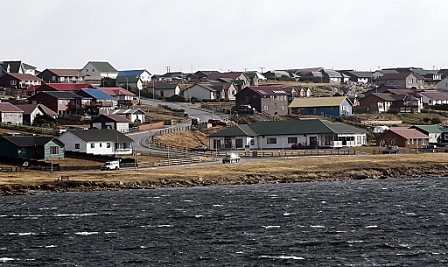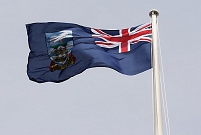Erstellt am: 7. 3. 2013 - 15:07 Uhr
The land of sheep, penguins, people and politics
Subscribe to the Reality Check podcast and get the whole programme after the show.
The Falkland Islands have an area of just over 12,000 square kilometers (that's about the size of Upper Austria) and a resident population of fewer than 3,000 people, but nearly half a million sheep, a large number of penguins and some reindeer.
Over the centuries, they have been French, Spanish, Argentine and British - and there are currently round 1,300 British military personnel stationed there - a force that has been maintained since the Falklands War in 1982. Back then, Argentina invaded the islands to, as they saw it, reclaim their territory of the "Malvinas". Britain launched a major military operation, and took the islands back - and Argentina has never quite got over it.

EPA
Now, the rhetoric is rising again. In January, Argentina's president, Cristina Fernandez de Kirchner, published an open letter to Britain's Prime Minister David Cameron. She claimed that the Falkland Islands or Malvinas had been forcibly stripped from Argentina in "a blatant exercise of 19th Century colonialism". Mr Cameron replied that Britain will go to war again over the Falklands if necessary.
So why is Argentina again getting so uppity about these remote islands that obviously consider themselves to be "Very British"? Nationalism or diversionary tactics? Maybe a bit of both, as Argentina struggles with its economic crisis.

EPA
This weekend, the residents the Falklands will be asked in a referendum whether they wish to continue to be British. The result is a foregone conclusion - but will that be an end to the dispute? Probably not.
Stacy Bragger, News Editor at the Falkland Islands Radio Service in Port Stanley, gave us his personal point of view on this referendum.
Dieses Element ist nicht mehr verfügbar
UN Peacekeepers in Golan Heights taken hostage
Philippine peacekeepers have been captured by Syrian rebels. Shashank Joshi looks at the significance of this development and the motivations that may lie behind it.
Dieses Element ist nicht mehr verfügbar
Reaction to death of Hugo Chavez
Julia Buxton looks at international reaction to the death of Hugo Chavez and what direction Venezuela might take in the future.
Dieses Element ist nicht mehr verfügbar
Private lending for Austrian business
Austrian shoe manufacturer, Heini Staudinger, is proposing alternative financing for small businesses. Hans Weitmayr of the Wirtschaftsblatt looks at the proposal and how it would work.
Dieses Element ist nicht mehr verfügbar
Forbidden Voices
Film director, Barbara Miller, talks about her documentary Forbidden Voices, about women bloggers in Cuba, China and Iran, ahead of the showing tonight as a part of the Frauen Film Tage festival.
Dieses Element ist nicht mehr verfügbar
FM4 Reality Check
Monday to Friday from 12.00 to 14.00, and after the show via Podcast or fm4.orf.at/realitycheck.


